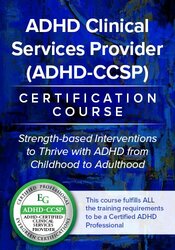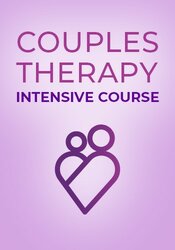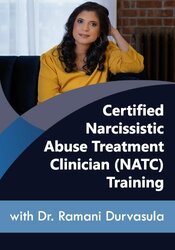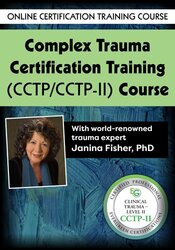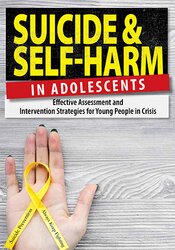Description
Helping young people heal is your greatest reward.
But when treating adolescents with depression, anxiety, and trauma the full extent of their suffering is not always obvious. Many in distress wear a mask of strength while secretly harming themselves or hiding their struggle with thoughts of suicide. You worry that you could be missing critical signs.
This seminar will provide you with the assessment tools you need to unmask self-harming and suicidal thoughts, adapt interventions from DBT and CBT to work with the distinct challenges of treating suicidal and self-harming adolescents, and manage the specific confidentiality and liability issues that accompany working with minors.
There’s too much at stake to be unprepared!
Purchase today and leave this critical program confident and capable in using these vital assessment tools and treatment techniques to bring hope and healing to vulnerable young clients!
CPD
Planning Committee Disclosure - No relevant relationships
All members of the PESI, Inc. planning committee have provided disclosures of financial relationships with ineligible organizations and any relevant non-financial relationships prior to planning content for this activity. None of the committee members had relevant financial relationships with ineligible companies or other potentially biasing relationships to disclose to learners. For speaker disclosures, please see the faculty biography.
CPD
This online program is worth 6.5 hours CPD.
Speaker
Tony Sheppard, PsyD, CGP, ABPP, AGPA-F, specializes in treating young people suffering from psychiatric issues including self-harm and suicide. A licensed psychologist and certified group psychotherapist, Tony brings over 20 years of experience working with children, adolescents, and young adults to his clinical practice. In addition to his private practice, Groupworks, he has trained hundreds of clinicians, educators, nurses, and physicians across the country in the treatment of self-harm and suicide and is the author of a training curriculum in group psychotherapy. He is board certified in group psychology.
Tony’s clinical approach draws from interpersonal neurobiology, Dialectical Behavior Therapy, solution-focused brief therapy, Cognitive Behavioral Therapy, and positive psychology. His creative and interactive delivery style will draw you into the dire nature of youth suicide and self-harm and have you leave feeling confident and prepared to handle this most important work.
Speaker Disclosures:
Financial: Dr. Tony Sheppard is the founder and director of Groupworks Psychological Services and has an employment relationship with Spalding University. He receives royalties as a published author. Dr. Sheppard receives a speaking honorarium and recording royalties from PESI, Inc. He has no relevant financial relationships with ineligible organizations.
Non-financial: Dr. Tony Sheppard has is a member of the Kentucky Psychological Association, the American Group Psychotherapy Association, and the American Association of Suicidology.
Objectives
- Employ clinical screening and assessment tools to help you determine which clients present the highest risk for suicide.
- Apply motivational techniques that engage resistant suicidal and self-harming teens in the therapeutic process.
- Develop strategies for incorporating schools and peer groups into your treatment plans for suicidal and self-harming clients, and communicate how this multi-systemic approach can improve treatment outcomes.
- Articulate how alternative coping strategies can be introduced in-session to help self-injuring clients manage triggering situations without engaging in self-harm.
- Communicate how clinicians can foster support among family members with techniques that promote problem solving and communication, and help young people feel in control and part of the therapeutic process.
- Utilize therapeutic interventions from Dialectical Behavior Therapy to improve your client’s coping skills and interpersonal effectiveness.
Outline
Suicide and NSSI
- The relationship between suicide and self-injurious behaviour
- When clients present with depression, anxiety, trauma
- Confidentiality, documentation, and legal considerations
Assessment Tools for Adolescents
- Formal assessment tools for NSSI
- Recency and frequency
- Severity
- Triggers
- Who’s aware
- Suicide risk assessment
- SAFE-T
- C-SSRS
- Ideation, plan, means, intent
- Level of risk, intervention and when to hospitalize
Motivational Interviewing Techniques That Engage Young People in Treatment
- Tips to quickly establish rapport
- Using the Stages to Change/Motivational Interviewing Model in Treatment
- Overcome therapy interfering behaviours
- When parents are ready for change NOW!
Adapt DBT for Use with Adolescents
- Track suicidal and self-harming urges with diary cards
- Reduce emotional reactivity and improve distress tolerance
- Identifying emotions and triggers
- Mindfulness practices and relaxation techniques
- Reproducible handouts and checklists
CBT Interventions to Build Coping Skills and Manage Crisis
- ”Thought flipping” to maintain positive focus
- Address body image issues
- Create opportunities to build resilience, self-efficacy and self-control
- Handle suicidal crisis – self-soothing and distraction techniques
Effectively Work with Parents, Peers and Schools
- Interpersonal effectiveness skills for adolescents
- Training exercises to convey feelings/read the feelings of others
- Integrate parents into treatment
- Parental behaviours that can do more harm than good
- Means restriction strategies for safe home environments
- Involve schools and peers
- Learn to build “Trusted Adult” support networks
- Peer education approaches that create support
- Minimize the impact of bullying
Target Audience
- Social Workers
- Psychologists
- Counselors
- Teachers
- School Administrators
- Case Managers
- Marriage and Family Therapists
- Addiction Counselors
- Therapists
- Nurses
- School Counselors
- School Social Workers
- School Psychologists
- Other Mental Health Professionals
Reviews
Overall:
5
Total Reviews: 4


